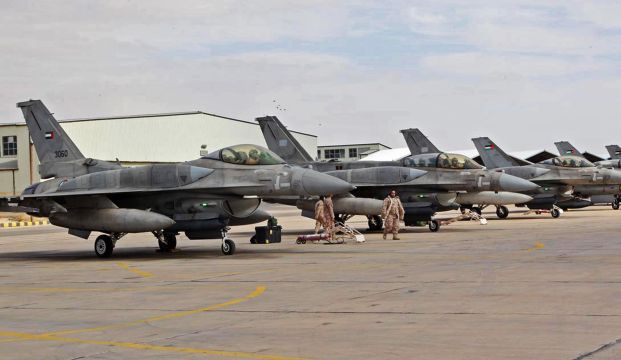
F-16 fighter jets from the United Arab Emirates (UAE) arrive at an air base in Jordan, on February 8, 2015. (REUTERS/Petra News Agency)
Washington, Reuters/Asharq Al-Awsat—US President Barack Obama will propose to Congress on Wednesday a new three-year authorization for the use of force against the Islamic State of Iraq and Syria (ISIS), with limits on US combat troops’ involvement, lawmakers and congressional aides said.
Obama has defended his authority to lead an international coalition against ISIS since August 8 when US fighter jets began attacking the jihadists in Iraq. But he has faced criticism for failing to seek the backing of Congress, where some accuse him of breaching his constitutional authority.
Facing pressure to let lawmakers weigh in on an issue as important as the deployment of troops and chastened by elections that handed power in Congress to Republicans, he said in November he would request formal authorization for the use of military force (AUMF).
An outline of that request, expected to be handed in to Congress on Wednesday, could stir debate over how US troops should be deployed and the extent of US engagement in Iraq and Syria.
The proposal would allow the use of special forces and advisers for defensive purposes but bar “enduring offensive ground forces,” lawmakers and aides said. It would not, however, set geographic limits for the campaign against the group.
Until now, Obama has justified US air strikes in Iraq and Syria under a 2001 authorization passed after the September 11 attacks and a 2002 authorization used by President George W. Bush in the Iraq war.
The new proposal would repeal the 2002 authorization but leave in place the 2001 AUMF, which has been invoked by the White House to carry out drone and missile strikes against suspected Al-Qaeda militants in Yemen and Somalia.
The request comes only a day after the final US hostage believed to be held by ISIS, 26-year-old aid worker Kayla Mueller, was confirmed to have been killed while in the custody of the group.
According to reports, ISIS provided Mueller’s family with photos and emails that allowed US intelligence agencies to confirm that she had been killed.
ISIS had earlier issued a statement claiming Mueller had died when the building she was being held in was struck by bombs from Jordanian aircraft, which was denied by the Jordanian government.
Confirmation of Mueller’s death also follows ISIS’s release of a video last week showing the group’s fighters executing a captured Jordanian pilot, Lt. Moaz Kasashbeh, by burning him alive. The footage sparked global condemnation and prompted Amman to launch a number of reprisal air raids against ISIS targets.
The United Arab Emirates also moved a squadron of air force jets to Jordan on Saturday to take part in the strikes against the group. The jets, a more sophisticated version of the US-built F-16s operated by Jordan, went into action for the first time on Tuesday adding extra firepower to the kingdom’s efforts to strike back against the jihadist group.
Fueled by outrage over the death of Mueller, as well as the slayings of journalists and the Jordanian pilot, US lawmakers said they planned quick hearings on the authorization, and a vote within weeks of Congress’ return from a February 16-20 recess.
Both Republicans and Democrats said there had been unusually close consultations between the administration and Capitol Hill on the authorization.
Many of Obama’s fellow Democrats, war-weary after more than a dozen years of fighting in Afghanistan and Iraq, say they will oppose any AUMF that includes “boots on the ground.”
Obama’s opposition to the Iraq War helped propel him to victory in the 2008 campaign and bringing troops home from Iraq and Afghanistan has been a focus of his presidency.
“I worry that this AUMF gives the ability for the next president to put ground troops back into the Middle East,” said Senator Chris Murphy, adding that that would be a sticking point for himself and many other Democrats.
Some hawkish Republicans oppose restrictions on military commanders such as a ban on ground troops. Others are calling for a more extensive authorization allowing US forces to challenge President Bashar Al-Assad of Syria, where a four-year-long civil war has fueled the rise of the ISIS.
“If the authorization doesn’t let us counter Assad’s air power, I think it will fail,” said Senator Lindsey Graham, a leading Republican foreign policy voice.
The White House has declined to discuss the specific time frame or details of its planned AUMF.
